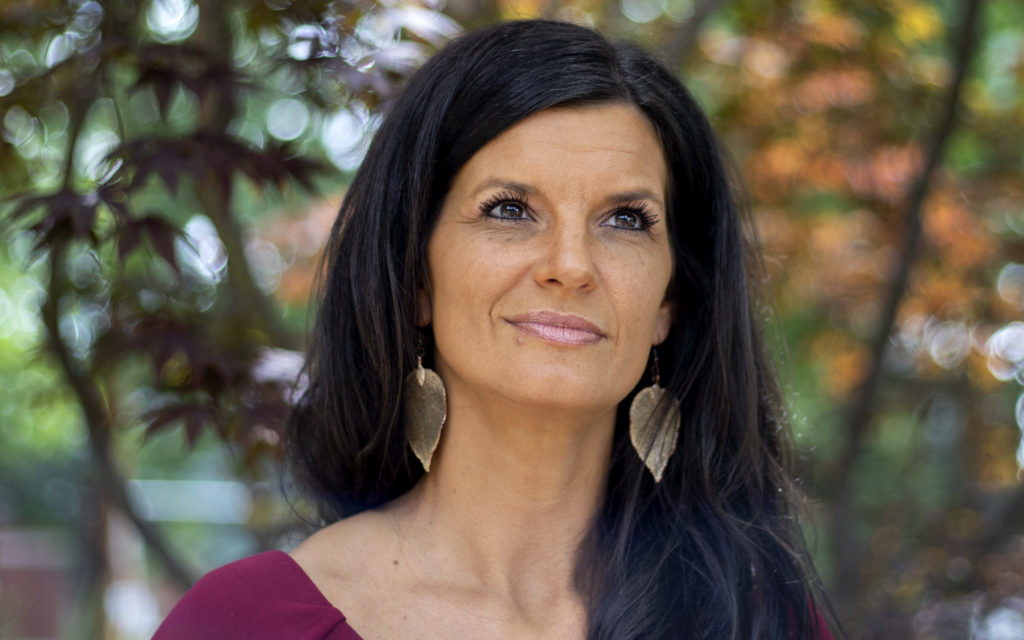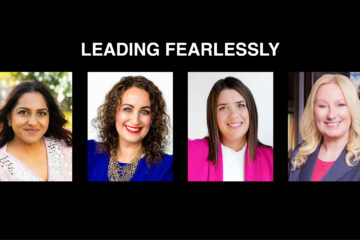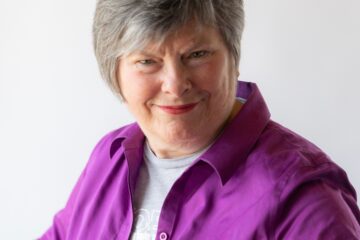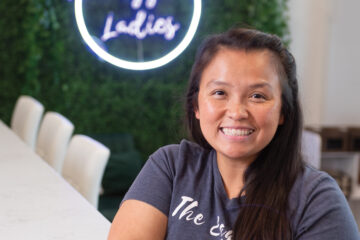
Melissa Vine is the executive director of Beacon of Life, a nonprofit that serves women in the Des Moines community who are experiencing homelessness due to trauma, substance abuse, domestic violence or incarceration. Additionally, is a public speaker and frequently holds workshops to help bring awareness of mental health and psychology into the workplace.
Vine is a domestic abuse survivor. She shares her story with the hope that other people who have experienced marginalization or trauma will benefit from it.
Warning: This story contains mentions of domestic abuse and may be triggering for some survivors.
I was in a relationship in which there was domestic violence and sexual assault.
The time I felt the most fearless, or rather, fearful, was when I made the decision to leave that relationship. The domino effect from that was that I lost about 90% of my social support as well.
I was raised in a home that looked really good on the outside but had a lot of dysfunction on the inside. When I would reach out for help, I was essentially told that I just needed to be a better wife.
I used to be in social circles where you had to play by certain rules. All my life, my identity had been built on my religious performance and what I had achieved and how I was viewed in those circles. I had been the one who judged and criticized other people, especially women, about what kind of wife or mom they were being. Now I was the one being judged and criticized. I was the woman who was getting stones thrown at her. I realized that this is what it felt like when I did that to other people all those years. It felt really awful.
Prior to the divorce I had friends, lots of support and I was financially well off. I was in the middle of a master’s program in counseling. Going through the divorce, I lost my friends, my money and my sense of self-worth. I was in a place where I didn’t know where money was going to come from, where friends were going to come from, but most of all, I didn’t know where my self-worth was going to come from.
I finished my master’s and began working as a counselor. I started a bakery because my ex-husband had quit paying child support once I got my degree. Because I was self-employed, there wasn’t a whole lot I could do to make that situation right and knew that I didn’t have the money to fight it.
Things were really hard. There were about two years where my four boys and I were living on $1,500 a month. My mortgage was $950 a month. I learned a lot about poverty. I remember someone saying to me, “You should go to this event. It’s only $10.” And I remember thinking, “No, you don’t understand. I don’t spend money on anything unless it’s bare minimum items like groceries or toilet paper.” But I couldn’t say that. And because I appeared to be middle class, because I owned a home, a car and I had a professional job, people didn’t realize that I was poor. I learned a lot about the shame issues that can surround being poor. You get used to not being able to buy things. At first it’s really hard to not order pizza or go to the movies, but then it becomes normal. The hard part is the shame. You just feel bad about yourself.
I can remember standing in line at the pool. I was in line to get a scholarship so that we could get a pass for the summer. This young guy that worked there yelled at the back of the line, “Are you here for the scholarship?” in front of all of my community members and I remember feeling so ashamed. Now, working with folks in poverty, especially generational poverty, I’m understanding that it’s not just about the physical needs but the psychological struggle that comes with it.
Business startups and the food industry were not the right fit for me. It was embarrassing to want something so badly and put in so much work and money into it, and see it struggle. I was thinking, “Well, if I can’t make this business successful, do I still have value?” I’ve always been an achiever. When I’m not achieving, do I still have value? When I’m poor and divorced and have no friends, do people still see value in me? When I strip away my achievement and my performance, will I find anything there? Do I have worth beyond what I do?
Over time I had to face a lot of fears, but I did it one step at a time.
I feared for my children, going through the divorce. I remember one of my sons saying, “I don’t know if I’m supposed to love Dad or if I’m supposed to hate Dad.” I said to him that it’s not a binary thing and that you can have a meaningful relationship with him and still have boundaries to protect yourself – and that relationships can be messy and complicated.
I had financial fears. I was a stay-at-home mom and had no access to income. When we split, he got an excellent lawyer and I had to find the cheapest lawyer I could find. I was completely bulldozed over during mediation but I had no recourse because I could not afford to go to court. I basically just had to say, “Well, if I want to get divorced I have to accept the terms.” It left me in complete poverty, but I was free. I had decided that I would rather be poor and free than have money and be trapped.
I remember cranking “Uptown Funk” in my kitchen and dancing with my toddler. I was thinking to myself, “I’m free. Even though it was so hard, I’m free. I’m free.” That felt amazing. I was free from that marriage, but also I felt free to explore who I really was.
So much of my life had been wrapped up in making my husband happy. That was my life goal. Knowing that he was very displeased with the decisions I was making as far as getting a divorce, I had a lot of fears around watching and listening to him be so angry with me.
We separated for the first time in 2012. We got back together after about six weeks. I did not understand the dynamics of abuse. There’s the honeymoon phase, the tension-building phase and the acting-out phase. After we separated he immediately went to the honeymoon phase, so I thought, “Oh, wow, he’s changed. He’s treating me well. He’s listening and he’s kind.” The day I moved back home he switched to the tension phase. In 2014 we separated the second time and I filed for divorce.
There was an incident days before the divorce where my partner — who was not allowed in my bedroom — came to the door and started yelling at me. I said, “You need to leave.” He came up to me, pinned me down on the bed and was yelling in my face. It was terrifying. Had anyone else in my life, or a stranger, done that, I would have called the police. But because it’s your partner, it’s complicated, because it’s mixed with feelings of love. So you don’t respond in the way that you would rationally respond to a situation like that. There were other times where we could laugh and have a lot of fun together, so this was very confusing.
I remember another day, I was really sick with the stomach flu. My four kids were ages 6 and under. I asked him if he could get lunch for us because I was too sick to make food. Typically in the patriarchal family model that I was living in, I was the one that made the food, so it took a lot even for me to ask him to get lunch. He took one of the kids with him and left. He came back six hours later with no lunch and had bought a Corvette instead. That was kind of how our relationship went. I would be so hurt, but because of the power of denial, I would shove it deep down and figure out how to cope so we could go on to the next day.
I had no clue how to establish boundaries. I never thought that you could actually say no to something that a man told you to do. That you have a voice and can stand up for yourself and say what you wanted. I had previously thought that that was sinful to do, and that it was selfish.
The first time I put a boundary in place was a big deal to me. I had been asked to load up our four kids in the car, drive across the state to stay in a hotel overnight because he had to work out of town. He wasn’t going to see us, he was just going to be sleeping there. The amount of work it would have taken to load up diapers, food and baby products and drive across the state to stay one night when we’re not even going to see you, I said, “No, that’s not worth it.” I got the silent treatment for several days because I had set that boundary.
What I didn’t understand at the time was that our relationship was fine as long as he was getting what he wanted. But as soon as I needed anything, that’s when the abuse would happen. I had been in denial for so long. When you don’t deal with psychological problems, they typically become physical problems. I was having difficulty walking. I became really sick. I got to the point where I felt like I was dying. I thought that if I didn’t get out of this relationship, I was going to get so sick that I couldn’t function anymore.
When I made the decision to separate, I was bombarded with people emailing me, sending me letters, stopping at my house, trying to shame me into going back. Any ounce of, “I think I’m doing the right thing” was consistently challenged every step of the way. There was not a shining moment of empowerment. As I separated from him, I felt incredibly guilty. I thought that I was doing something wrong and that God was going to be angry with me.
When I was in grad school — [it was an online school but you would go on the campus out of state for a week] — there was this woman that spoke up in one class. There was something that she said that made me want to connect with her at one point that week. We didn’t end up doing that. When I got to my connecting airport, she and I both had a three-hour layover and we were in the same area. I sat down and I said, “This is going to sound weird, but I feel like I’m supposed to talk to you.” We got to talking and I came to find out that her daughter had just gone through an abusive husband who was narcissistic. She said that her daughter was terrified because the Bible said that a woman should not separate from her husband. I remember getting on the plane and leaning my head against the window and thinking, “I’m going to file for divorce.”
I had this crazy thing happen. There was a date we had gone on toward the end of our relationship. We were driving home and an RV drove up beside us. We were in the middle of an argument. The date had been verbally and emotionally abusive. One of the windows fell off the RV, landed on our windshield and shattered.
That night I went to bed and I woke up in the middle of the night because I heard a crash. I went out to the living room and the picture of us that was on our mantle — that was completely secure — fell off and shattered.
Now I’m thinking, I feel like I’m supposed to be getting a message but things happen in threes. As I was questioning my decision on filing for divorce, I asked [God] for a third sign of broken glass.
The next morning, my best friend Lisa came over. As we were talking, she got a text from my ex — she managed our businesses — and the message said, “I’m at this job site and the glass broke on one of the garage door windows.” In 10 years of owning that garage door business, that had never happened.
That was the closest moment I had to feeling that I was on the right track. The broken glass was a sign of confirmation for me.
Over the next month, I got a townhouse with basic necessities and utilities ready for him. I had set it up where I would tell him, and then the movers would show up. My dad was at the house. I had everything all lined up. That was definitely the worst day of my life. I did love him and it took a while after our divorce that I could honestly say that I didn’t love him anymore. I didn’t divorce him because I stopped loving him. I divorced him because I wasn’t safe.
It was a really dark time in my life. But now that I’ve been through it and have come out, I’m thankful for that time and for the things I learned about myself. I had a complete paradigm shift. I learned that I was really good at telling people the way things should be and not good at listening. That experience taught me to listen to people who grew up differently than me, who had different backgrounds, perspectives and beliefs.
I’m not afraid of my story anymore. I used to be. I used to be afraid of who I was and what people thought. I was afraid of people thinking that I was incompetent or immature or impulsive.
Now I feel more like myself than I ever have. It’s scary, terrifying at times. There are times when I curl up in the dark and cry and wonder why I didn’t just stay satisfied with living in denial because living authentically and with courage is so hard. But it’s totally worth it.
It felt like running through mud that came up to my neck but I could see a tiny light in the distance that I was running toward. The light was so small and dim. But I saw it. If I can just keep going, I think that light will get bigger. And it did. Now I feel like I’m living in that light. I don’t have to squint to see the light anymore.
What does it mean to be fearless?
I think being fearless is more about the journey than the destination. I can’t wake up one day and just decide to be fearless. I wake up every day with a host of fears and I decide whether I’m going to face those fears. In order to face those fears, it takes a lot of courage.
You mentioned the idea of courage over confidence. What does that mean?
Confidence is really easy. Confidence means, I have a track record of doing something well and when I go to do that thing, I feel confident that I’m going to do it well. There are a lot of things I don’t feel confident doing, and it takes courage to do those things. Courage is, this might not turn out OK. I might make some mistakes, but I’m going to try it anyway. The tricky thing is, sometimes we tell people to feel confident, and as soon as they feel uncomfortable, they think they’re doing something wrong. If we instead tell people to have courage, which, by the way, is really uncomfortable, then when I have those feelings of discomfort, I’m less likely to run and give up, because I expect it to be uncomfortable and hard. The more we act with courage, eventually we will feel confident.
What does being fearless look like?
I think we tend to picture fearlessness as something almost fantasy-like. We paint these unrealistic pictures of scenarios that will probably never play out in our life. Real courage, real fearlessness, that’s something like having a difficult conversation with a loved one or a co-worker. It’s checking in with someone who seems to be struggling with someone and being ready to listen. It’s opening our mind to a perspective that’s different from our own. Those things are courageous and they’re actually small. It’s not the stuff that’s going to end up on the news. It’s, “Hey, there’s some tension between me and this person and we need to talk about it.” It’s, “Hey, my kid just rolled my eyes at me and I need to hear what might be bothering them.” We build courage in the small things.
What does it feel like to be fearless?
I don’t know that I ever have been fearless. It does feel amazing to face your fears. And if by fearless you mean facing your fears, and not running away from them, it feels really scary in the moment but then afterward when you grow as a person, that feels amazing.
How does someone become fearless?
We become fearless by facing our fears one at a time. It helps if you have support. Education is helpful. The more you can read and learn, the easier it is to face your fears because you can make decisions that are more in line with humanity and you as a person. Education helps you understand what reality is and how you get there.
Draw the word fearless.
I picture myself trying to move through mud that is up to my neck. I can see this tiny little light in the distance and almost everything around me is saying this is the wrong direction, this is scary. But I see that light and it’s just enough to keep me going. And as I keep working through the mud, the light gets bigger and bigger until I’m walking in the light. And then I understand why I kept going even when it seemed ridiculous.
Editor’s note: This story has been updated to reflect the correct years that Melissa Vine separated from her husband.


